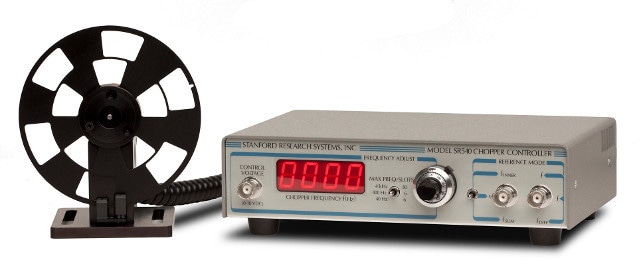Jun 10 2013
An optical chopper is a device that interrupts a light beam at periodic intervals. By varying the frequency of operation of the chopper it can be used for various applications. The first ever optical chopper was invented in the 1800s and was used to measure the speed of light.
The chopper consists of a mechanical disc that rotates at a certain speed. In order to improve the performance of the chopper high precision and stable mechanical components must be chosen. This worksheet will provide details on the working principle, construction and applications of optical beam choppers.

The SR540 optical beam chopper from Stanford Research Systems
Working Principle
A light beam is made to fall on the chopper’s rotating disc. The disc is rotated at a particular frequency; as a result the light beam is interrupted (chopped) at regular intervals. The nature of the slots on the disc and the frequency of rotation determine the interval at which the beam is chopped.
Construction and Types of Optical Choppers
The optical chopper consists of a mechanical chopper disc with shutters. This disc is rotated at various speeds by using a motor. The classification of choppers is done based on the frequency of operation as – variable frequency rotating disc chopper, fixed frequency tuning fork chopper and optical shutters.
Applications
Typical applications of optical choppers are as below:
- Optical spectrometers, ion neutron beam instruments
- Modulation of intensity of optical signals
- Wheel speed sensors
- Anti-lock braking systems.
Sources and Further Reading